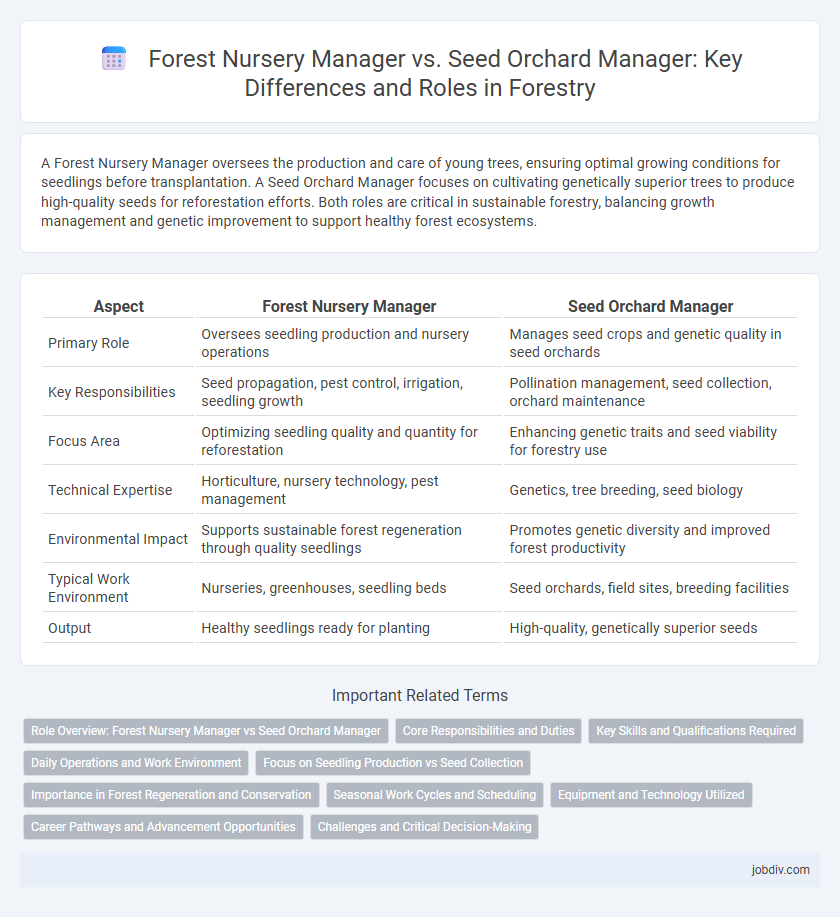A Forest Nursery Manager oversees the production and care of young trees, ensuring optimal growing conditions for seedlings before transplantation. A Seed Orchard Manager focuses on cultivating genetically superior trees to produce high-quality seeds for reforestation efforts. Both roles are critical in sustainable forestry, balancing growth management and genetic improvement to support healthy forest ecosystems.
Table of Comparison
| Aspect | Forest Nursery Manager | Seed Orchard Manager |
|---|---|---|
| Primary Role | Oversees seedling production and nursery operations | Manages seed crops and genetic quality in seed orchards |
| Key Responsibilities | Seed propagation, pest control, irrigation, seedling growth | Pollination management, seed collection, orchard maintenance |
| Focus Area | Optimizing seedling quality and quantity for reforestation | Enhancing genetic traits and seed viability for forestry use |
| Technical Expertise | Horticulture, nursery technology, pest management | Genetics, tree breeding, seed biology |
| Environmental Impact | Supports sustainable forest regeneration through quality seedlings | Promotes genetic diversity and improved forest productivity |
| Typical Work Environment | Nurseries, greenhouses, seedling beds | Seed orchards, field sites, breeding facilities |
| Output | Healthy seedlings ready for planting | High-quality, genetically superior seeds |
Role Overview: Forest Nursery Manager vs Seed Orchard Manager
A Forest Nursery Manager oversees the propagation, cultivation, and care of young trees and seedlings, ensuring optimal growth conditions for reforestation projects. In contrast, a Seed Orchard Manager focuses on managing controlled breeding areas to produce genetically superior seeds, emphasizing seed quality and genetic diversity. Both roles are critical for sustainable forest regeneration but specialize in different stages of tree production and genetic resource management.
Core Responsibilities and Duties
A Forest Nursery Manager oversees the propagation, cultivation, and health management of seedlings to ensure high-quality stock for reforestation projects. A Seed Orchard Manager is responsible for the management and genetic improvement of seed orchards, focusing on controlled pollination and seed collection to produce superior tree genetics. Both roles require expertise in silviculture but differ in their emphasis on seed production versus seedling cultivation.
Key Skills and Qualifications Required
Forest Nursery Managers require expertise in seedling cultivation, pest management, and soil science, along with skills in workforce supervision and inventory control. Seed Orchard Managers need advanced knowledge of genetic selection, controlled pollination techniques, and orchard layout planning, combined with proficiency in data analysis and long-term breeding program management. Both roles demand strong leadership, record-keeping accuracy, and familiarity with forestry regulations and environmental sustainability practices.
Daily Operations and Work Environment
A Forest Nursery Manager oversees daily operations such as seedling propagation, irrigation management, pest control, and soil preparation within controlled nursery settings, ensuring optimal growth conditions. A Seed Orchard Manager focuses on the cultivation and maintenance of genetically superior seed-producing trees, monitoring pollination, pruning, and seed collection across outdoor orchard environments. Both roles require fieldwork and detailed record-keeping, but nursery managers operate primarily in nursery beds and greenhouses, while seed orchard managers work in larger, more exposed seed orchards with emphasis on genetic selection and seed quality.
Focus on Seedling Production vs Seed Collection
A Forest Nursery Manager specializes in seedling production by overseeing germination, nurturing young trees, and ensuring optimal growth conditions to supply healthy saplings for reforestation projects. In contrast, a Seed Orchard Manager focuses on seed collection by maintaining genetically superior tree orchards, coordinating controlled pollination, and harvesting high-quality seeds for future planting. Both roles are critical in sustainable forest management but differ in their core emphasis on producing seedlings versus procuring viable seeds.
Importance in Forest Regeneration and Conservation
A Forest Nursery Manager plays a critical role in forest regeneration by overseeing the propagation and cultivation of seedlings that ensure a steady supply of healthy, genetically diverse plants for reforestation projects. In contrast, a Seed Orchard Manager focuses on maintaining genetically superior parent trees to produce high-quality seeds essential for enhancing forest resilience and biodiversity. Both roles are vital for sustainable forest conservation, as nurseries provide the plants needed for restoration while seed orchards supply the genetic material that strengthens future forest ecosystems.
Seasonal Work Cycles and Scheduling
Forest Nursery Managers concentrate on seasonal planting, watering, and seedling care cycles that peak in spring and early summer to ensure optimal seedling growth. Seed Orchard Managers oversee seed collection and cone harvest schedules, primarily from late summer to early fall, focusing on genetic selection and timely seed extraction. Both roles require precise scheduling to align with natural growth phases and climate conditions to maximize forest regeneration success.
Equipment and Technology Utilized
Forest Nursery Managers utilize advanced irrigation systems, automated seedling trays, and climate-controlled greenhouses to optimize seedling growth and survival rates. Seed Orchard Managers employ genetic tracking software, precision pollination tools, and remote monitoring drones to enhance seed quality and genetic diversity. Both roles leverage GIS mapping technology for site selection and resource management, ensuring operational efficiency.
Career Pathways and Advancement Opportunities
Forest Nursery Managers typically advance by gaining expertise in seedling cultivation and pest management, leading to roles overseeing larger nurseries or regional production operations. Seed Orchard Managers focus on genetic selection and orchard maintenance, often progressing to positions that involve breeding program coordination or seed certification leadership. Both career paths offer opportunities in research, forestry consultancy, and senior management within government agencies or private forestry companies.
Challenges and Critical Decision-Making
Forest Nursery Managers face challenges such as optimizing seedling growth conditions, managing pest control, and ensuring genetic quality, requiring critical decisions on resource allocation, propagation techniques, and disease management strategies. Seed Orchard Managers must balance genetic diversity preservation with maximizing seed production efficiency, addressing issues like pollination control, orchard layout, and clonal selection. Both roles demand expertise in environmental monitoring and adaptive management to meet reforestation goals and sustain forest productivity.
Forest Nursery Manager vs Seed Orchard Manager Infographic

 jobdiv.com
jobdiv.com